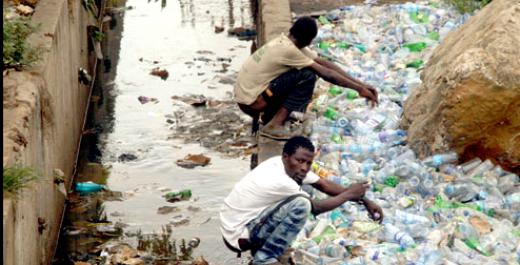The Society for Water and Sanitation (NEWSAN) has raised an alarm over continuous practice of open defecation in Internally Displaced Persons (IDPs) camps at Dagban and Wassa in the Federal Capital Territory (FCT).

Mr Benson Attah, the National Coordinator of NEWSAN, expressed the fear on Tuesday, June 19, 2018 in Abuja when he led other members of the group on a visit to the headquarters of Abuja Environmental Protection Agency (AEPB).
He said that more than 6,000 persons living in the two camps did not have any toilet to use whenever they wanted to defecate, adding that the unwholesome development ought to be addressed.
He stressed that if urgent efforts were not made to stop the continuous practice of open defecation at the camps, there could an outbreak of water-borne diseases such as cholera and diarrhoea.
Attah said that the group found it expedient to draw the attention of the authorities to the plight of the IDPs regarding the poor hygienic conditions and the lack of water supply in the camps.
He stressed that people’s access to Water, Sanitation And Hygiene (WASH) facilities would facilitate inclusive development.
He particularly noted that the site of the IDPs camp in Wassa community, which belonged to private individuals, was littered with faeces, calling for urgent action from relevant agencies to deal with the situation.
“We recently heard of cholera outbreaks in Niger and Kogi states. Imagine the proximity of these IDPs camps to the Abuja city centre; we can’t just keep quiet like that.
“Most of the persons living in these camps interact with people in town; they are the wheelbarrow pushers, the fruit sellers; they enter the same vehicles with us and we interact with them daily.
“If any outbreak of cholera occurs in that part of the FCT, that means danger to everyone. We need to do something as soon as possible, it is a ticking time bomb,’’ he said.
Attah said that his group would not relent in its efforts to ensure an improvement in the people’s access to water and sanitation, adding that efforts in that regard were important if Nigeria wanted to attain the Sustainable Development Goals (SDGs) by 2030.
Responding, Mr Jacob Areo, the Deputy Director, Administration, AEPB, commended the group for the visit and for highlighting the plight of the IDPs in the camps.
He said that a report was already being collated to address perceptible areas of interventions, adding that the overall goal of the board was to scale up hygiene promotion practices in the FCT.
Areo said that the board also had a list of WASH needs in the satellite towns of Abuja, adding, however, that there was a need for improved collaboration between relevant stakeholders to promote hygiene practices in the FCT.
He said that the board would liaise with the National Emergency Management Agency (NEMA) to identify the intervention projects that should be executed in the IDPs camps.
He added that such interventions could be in the form of the provision of temporary toilets to tackle the deplorable conditions of the camps.
By Tosin Kolade
